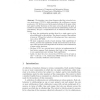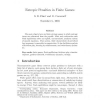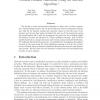132
Voted
CORR
2007
Springer
15 years 19 days ago
2007
Springer
Abstract—In this contribution, the performance of a multiuser system is analyzed in the context of frequency selective fading channels. Using game theoretic tools, a useful frame...
101
Voted
CORR
2010
Springer
15 years 19 days ago
2010
Springer
Abstract. We introduce a new class of games called the networked common goods game (NCGG), which generalizes the well-known common goods game [12]. We focus on a fairly general sub...
117
Voted
CORR
2010
Springer
15 years 19 days ago
2010
Springer
An important issue in wireless communication is the interaction between selfish and independent wireless communication systems in the same frequency band. Due to the selfish natur...
92
Voted
PE
2002
Springer
15 years 21 days ago
2002
Springer
The paper studies routing in loss networks in the framework of a non-cooperative game with selfish users. Two solution concepts are considered: the Nash equilibrium, corresponding...
81
Voted
ANOR
2002
15 years 28 days ago
2002
A subgame perfection refinement of Nash equilibrium is suggested for games of the following type: each of an infinite number of identical players selects an action using his privat...
97
Voted
JSAC
2007
15 years 28 days ago
2007
— This paper reverse-engineers backoff-based random-access MAC protocols in ad-hoc networks. We show that the contention resolution algorithm in such protocols is implicitly part...
105
Voted
TSP
2008
15 years 28 days ago
2008
In this two-part paper, we propose a decentralized strategy, based on a game-theoretic formulation, to find out the optimal precoding/multiplexing matrices for a multipoint-to-mult...
117
Voted
ANOR
2005
15 years 29 days ago
2005
The main objects here are finite-strategy games in which entropic terms are subtracted from the payoffs. After such subtraction each Nash equilibrium solves an explicit, unconstra...
121
Voted
PPL
2006
15 years 1 months ago
2006
In the model of restricted parallel links, n users must be routed on m parallel links under the restriction that the link for each user be chosen from a certain set of allowed lin...
88
Voted
JSAC
2006
15 years 1 months ago
2006
We develop a novel auction-based algorithm to allow users to fairly compete for a wireless fading channel. We use the second-price auction mechanism whereby user bids for the chan...



